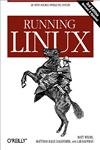Inhaltsangabe
Once a little-known productivity boost for personal computers, Linux is now becoming a central part of computing environments everywhere. This operating system now serves as corporate hubs, Web servers, academic research platforms, and program development systems. All along it's also managed to keep its original role as an enjoyable environment for personal computing, learning system administration and programming skills, and all-around hacking. This book, now in its third edition, has been widely recognized for years in the Linux community as the getting-started book people need. It goes into depth about configuration issues that often trip up users but are glossed over by other books. A complete, UNIX-compatible operating system developed by volunteers on the Internet, Linux is distributed freely in electronic form and at a low cost from many vendors. Developed first on the PC, it has been ported to many other architectures and can now support such heavy-duty features as multiprocessing, RAID, and clustering. Software packages on Linux include the Samba file server and Apache Web server; the X Window System (X11R6); TCP/IP networking (including PPP, SSH, and NFS support); popular software tools such as Emacs and TeX; a complete software development environment including C, C++, Java, Perl, Tcl/Tk, and Python; libraries, debuggers, multimedia support, scientific and database applications, and much more. Commercial applications that run on Linux range from end-user tools like word processors and spreadsheets to mission-critical software like the Oracle, Sybase, Informix, and IBM DB/2 database management systems. Running Linux explains everything you need to understand, install, and start using the Linux operating system. This includes a comprehensive installation tutorial, complete information on system maintenance, tools for document development and programming, and guidelines for network, file, printer, and Web site administration. New topics in the third edition include: KDE, a desktop that brings the friendliness and ease-of-use of Windows or the Macintosh to Linux Samba, which turns Linux into an office hub that serves files and printers to Microsoft systems PPP, the most popular software for logging into remote systems over phone lines Revised instructions for installation and configuration, particularly covering the Red Hat, SuSE and Debian distributions
Über die Autorin bzw. den Autor
Matt Welsh is a Ph.D. student at the University of California, Berkeley settling in sunny California after spending time wandering around Europe and braving the harsh winters of upstate New York. He has been a long-time Linux advocate and developer, a role which saw him fielding questions from thousands of Linux users over the years. Matt was the original coordinator of the Linux Documentation Project and author of the seminal Linux Installation and Getting Started Guide. More recently, he has been promoting the use of Linux for supercomputing applications through the Extreme Linux working group. At Berkeley, his research involves the intersection of next-generation Internet systems and high-performance computing. His varied and sundry interests include world travel, Zen Buddhism, experimental music, and backpacking. Matthias Kalle Dalheimer works as an independent author, translator and software consultant in Northern Germany, where he lives in a tiny village with his wife and son. After studying computer science and general linguistics, he first worked for Star Division, where he was responsible for porting the office suite Star Office to Linux. In spring 1997, he quit his job and became a happy freelancer. Kalle mainly uses Linux for his development work and uses XEmacs 20.4 for most of his programming and writing tasks. In his spare time, he plays with his son, hikes in the surrounding forests, reads books about history, and helps develop the K Desktop Environment, a free desktop for Unix systems. He has written Programming with Qt for O'Reilly & Associates, and has written and translated a number of O'Reilly books in German. Lar Kaufman is a law student at Boston University, living in Concord, Massachusetts. He has worked as a documentation consultant for many years, and began writing about UNIX in 1983. Since then, he has written on System V, BSD, Mach, OSF/1, and Linux. His hobbies include interactive media as art/literature, homebuilt and antique aircraft (he's a licensed aircraft mechanic), and natural history. Formerly a BBS operator, in 1987 Lar founded the Fidonet echoes (newsgroups) Biosphere and BioNews. He is currently working on a project to develop a media lab incorporating adaptive technology for print-disabled use through the law library where he studies. The lab will use a Linux server and provide user services on Windows NT, Macintosh, and Linux systems.
„Über diesen Titel“ kann sich auf eine andere Ausgabe dieses Titels beziehen.
